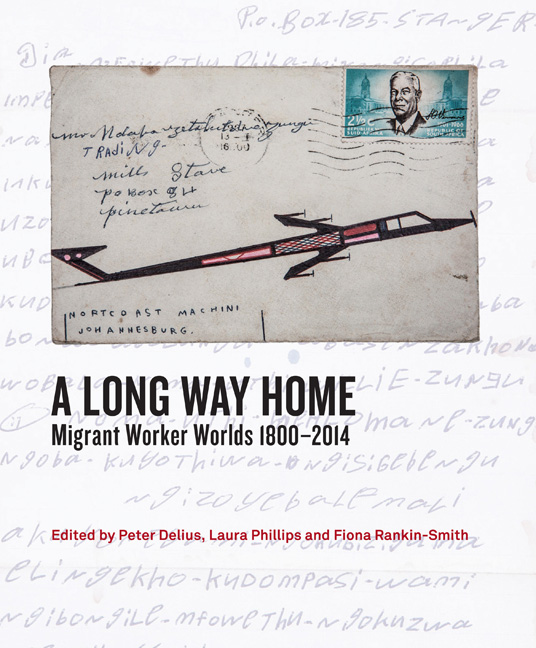Book contents
- Frontmatter
- Contents
- Acknowledgements
- Introduction: Highlighting Migrant Humanity
- Chapter 1 Ngezinyawo - Migrant Journeys
- Chapter 2 Slavery, Indenture and Migrant Labour: Maritime Immigration from Mozambique to the Cape, c.1780–1880
- Chapter 3 Walking 2 000 Kilometres to Work and Back: The Wandering Bassuto by Carl Richter
- Chapter 4 A Century of Migrancy from Mpondoland
- Chapter 5 The Migrant Kings of Zululand
- Chapter 6 The Art of Those Left Behind: Women, Beadwork and Bodies
- Chapter 7 The Illusion of Safety: Migrant Labour and Occupational Disease on South Africa's Gold Mines
- Chapter 8 ‘The Chinese Experiment’: Images from the Expansion of South Africas ‘Labour Empire’
- Chapter 9 ‘Stray Boys’: The Kruger National Park and Migrant Labour
- Chapter 10 Surviving Drought: Migrancy and the Homestead Economy
- Chapter 11 Migrants from Zebediela and Shifting Identities on the Rand, 1930s–1970s
- Chapter 12 Verwoerd's Oxen: Performing Labour Migrancy in Southern Africa
- Chapter 13 ‘Give My Regards to Everyone at Home Including Those I No Longer Remember’: The Journey of Tito Zungu's Envelopes
- Chapter 14 Sophie and the City: Womanhood, Labour and Migrancy
- Chapter 15 Bungityala
- Chapter 16 Migrants: Vanguard of the Worker's Struggles?
- Chapter 17 Debt or Savings? Of Migrants, Mines and Money
- Chapter 18 Post-Apartheid Migrancy and the Life of a Pondo Mineworker
- Notes on Contributors
- List of Figures and Tables
- Index
Chapter 15 - Bungityala
Published online by Cambridge University Press: 04 July 2018
- Frontmatter
- Contents
- Acknowledgements
- Introduction: Highlighting Migrant Humanity
- Chapter 1 Ngezinyawo - Migrant Journeys
- Chapter 2 Slavery, Indenture and Migrant Labour: Maritime Immigration from Mozambique to the Cape, c.1780–1880
- Chapter 3 Walking 2 000 Kilometres to Work and Back: The Wandering Bassuto by Carl Richter
- Chapter 4 A Century of Migrancy from Mpondoland
- Chapter 5 The Migrant Kings of Zululand
- Chapter 6 The Art of Those Left Behind: Women, Beadwork and Bodies
- Chapter 7 The Illusion of Safety: Migrant Labour and Occupational Disease on South Africa's Gold Mines
- Chapter 8 ‘The Chinese Experiment’: Images from the Expansion of South Africas ‘Labour Empire’
- Chapter 9 ‘Stray Boys’: The Kruger National Park and Migrant Labour
- Chapter 10 Surviving Drought: Migrancy and the Homestead Economy
- Chapter 11 Migrants from Zebediela and Shifting Identities on the Rand, 1930s–1970s
- Chapter 12 Verwoerd's Oxen: Performing Labour Migrancy in Southern Africa
- Chapter 13 ‘Give My Regards to Everyone at Home Including Those I No Longer Remember’: The Journey of Tito Zungu's Envelopes
- Chapter 14 Sophie and the City: Womanhood, Labour and Migrancy
- Chapter 15 Bungityala
- Chapter 16 Migrants: Vanguard of the Worker's Struggles?
- Chapter 17 Debt or Savings? Of Migrants, Mines and Money
- Chapter 18 Post-Apartheid Migrancy and the Life of a Pondo Mineworker
- Notes on Contributors
- List of Figures and Tables
- Index
Summary
Some time in 2006, I met a retired gold miner who called himself Bungityala in his home village on the coastline of eastern Mpondoland. Bungityala's village is among the most stunning places I have ever seen. The hills that surround it somehow manage to seem gently pastoral and yet exhilaratingly wild, for sometimes it is as if the wind is sweeping through you and lifting you off the ground and you are about to fly. In part it is because the topography is so unpredictable; you can turn a corner and suddenly find yourself staring way down at hilltops and you wonder how it is that you got so high. In the early evenings, I would sit in the spaza shops and the shebeens in little hillside sheds, drinking stout beer with the elderly people of Bungityala's village. I can vouch that these elderly people are capable of drinking a lot of stout beer. They grow drunken and coarse and all sorts of venom and humour and amusement come tumbling from them and you can learn a great deal about a place by insinuating yourself into these snug sheds of inebriation.
Sitting in one of these sheds in the early evening, drinking stout beer with two elderly women, I looked out of the shed's open door and I saw the legs and the torso of a great, athletic horse pass right by, just inches from the door. I stepped outside the shed to find an elderly man in sharp riding boots atop a magnificent racing horse. He looked down at me imperiously and smiled to himself, his eyes quite bloodshot, which struck me as odd, because he had not even sat down to his beer. I was to discover later that Bungityala had spent the entire afternoon taking his horse from one shebeen to another, that he already had a great deal of stout beer in his veins and this was his last stop on his way home, which was across the beach and on the other side of the lagoon.
Bungityala tethered his horse and entered the shed in his heavy riding boots and ordered a stout beer. He was a short man and his riding boots came almost up to his knees, which made him look even shorter, for it was hard not to imagine that the man only began where the boots ended.
- Type
- Chapter
- Information
- A Long Way HomeMigrant Worker Worlds 1800–2014, pp. 215 - 223Publisher: Wits University PressPrint publication year: 2014



